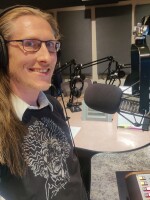About 50 people from across the country met at Albuquerque’s Uptown Sheraton hotel over the weekend with one common thing uniting them: All had lost a loved one to overdose.
Something else they shared was a passion to fight the opioid crisis.
The smell of fresh brewed coffee and breakfast pastries permeated the Roxy Room on the hotel’s first floor. A photo album sat on a table, and four large banners adorned the walls near the back of the room, all filled with the faces of people who passed from overdoses looking out at the conference and up at the presenters.
Speaker Chris Schaffner said, when he is discussing the opioid crisis, faces and names of those he has lost over the years flood his mind.
“And then when I look around at all these other faces and names who I don't know, it's like we have — we've got — to do something radically to stop this,” he said. “Because we don't have any more space on the walls.”
The 2024 GRASP Healing Hearts and Changing Pathways Conference was split into two days on Sept. 13 and 14.The first focused on healing the grief and emotional trauma that can come up when dealing with addiction. The second focused on solutions to the crisis and how to improve the status quo.
Shaffner presented on the children’s drug education program Safety First, which uses harm reduction and science-based information to empower youth to make informed decisions and navigate risks.
“It also fosters open communication, and I don't think this can be [over]stated enough, the importance of having an engaging and nonjudgmental, non-stigmatizing conversation with people will keep that door open,” he said. “[If]the door closes, we lose influence on our young people.”
Schaffner said Safety First fosters social and emotional development as well, equipping kids with resilience and emotional intelligence to make better decisions and navigate peer pressure and other social dynamics that influence drug use.
He said older programs, even though they were created with good intentions, could have negative effects if they didn’t approach the material with honesty, and the kids with respect.
“Studies, including one by the American Psychological Association, found that the DARE program did not reduce drug use or change students’ attitudes towards drugs in the long term,” he said. “In fact, some students who went through the program were found to be more likely to experiment with drugs later on.”
His talk followed a presentation on harm reduction practices, like needle exchanges and safe-use spaces, and was followed by a training on how to use the overdose reversal medication Narcan properly.
The conference was not all talk of the heavy emotional burden of turning loss into action. Moments of levity often broke into the conversation, like when Shaffner described kids ages 11-13 as, "exploding with hormones and they're just — they smell — Oh, they smell,” to gales of audience laughter.
Addiction advocacy nonprofit Broken No More put on the conference with help from Vital Strategies, another nonprofit dedicated to fighting the opioid crisis.
Broken No More is a nationwide organization that backs drug policies, “Based on public health, harm reduction, and science, while opposing … punitive policies,” according to its website. It also provides support to those who have lost loved ones to drugs through the offshoot GRASP, which stands for Grief Recovery After Substance Passing. The organization hosts meetings, among other events, and private Facebook groups.
Executive Director Dr. Tamara Olt said those are popular ways for people to get direct support and find others who have gone through what they have.
“We want this to be a safe, nonjudgmental place where we can discuss what happened to our families and how we move forward,” she said. “and what we can do to prevent other families from experiencing this.”
Olt said the conference’s relatively low turnout could have been because the organization has not held one for six years. But she said that small size also allowed for an intimate, deeply connected conversation.
“I just had this super good vibe there that everybody that was there really cared, really wanted to be there, wanted to learn,” she said. “We had a lot of really good interactions, really good questions and comments.”
Olt said the conference usually runs every two years but got postponed because of the pandemic. Going forward, the group plans to get back to the regular conference schedule. Though it probably will not be in Albuquerque next time, Olt said she fell in love with the city while visiting.
“Like, I want to move there. You know, I met some fantastic people,” she said. “And so, yeah, we're thrilled with it, thrilled with the choice.”
And some locals apparently fell in love with GRASP, as well. Olt said a couple expressed interest in starting a chapter here in New Mexico, which has been hit hard by the opioid epidemic.
Support for this coverage comes from the W.K.Kellogg Foundation.




